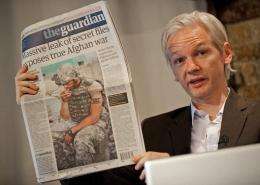Australian founder of whistleblowing website, 'WikiLeaks', Julian Assange holds up a copy of the Guardian newspaper during a press conference in London on July 2010. WikiLeaks' mass exposure of US diplomatic cables has divided liberal intellectual opinion between supporters of total government transparency and those who see a threat to democratic rule.
WikiLeaks' mass exposure of US diplomatic cables has divided liberal intellectual opinion between supporters of total government transparency and those who see a threat to democratic rule.
While the world's press has splashed the revelations across its front pages even some journalists have begun to wonder whether too much exposure is a good thing in an era of instant global electronic communication.
"Much, but not all state information should be public," argued the Financial Times, in a leader. "In order for states to conduct their affairs effectively, and ensure the security of their citizens, some secrets must remain."
WikiLeaks founder Julian Assange defended previous leaks of US military reports from Iraq and Afghanistan by declaring he was "trying to stop two wars" -- but some fear his latest stunt could provoke new ones.
News that Arab leaders and Israel are pushing for US air strikes on Iran and that China is rethinking its protection of North Korea's erratic regime has increased tensions in two of the world's most dangerous flashpoints.
And some fear that if diplomats can no longer be confident that they can exchange frank views in private, then it will be harder for capitals to resolve disputes without inflaming public opinion or angering rival players.
"In a world criss-crossed by violent conflict, a state can not permanently operate under the constant gaze of opinion," warned Laurent Joffrin, editor of France's left-wing Liberation daily, a champion of media freedoms.
The stolen cables were downloaded from a supposedly secure US government network that was set up in the wake of the terror attacks of September 11, 2001 in order to allow analysts to rapidly share and compare information.
Some have expressed concern that diplomatic and intelligence agencies will retreat inside their shells and fail to prevent future attacks if clues are scattered across different, more tightly-controlled networks.
During previous WikiLeaks revelations, the group was also accused of putting the lives of US informants and locally recruited agents at risk.
Such concerns even motivated groups more usually associated with campaigning for openness and press freedom to criticise the all-or-nothing character of an operation that exposed tens of thousands of documents.
This time round, however, there has been praise for the professional investigation run by the five newspapers which got first sight of the files -- the New York Times, The Guardian, Le Monde, El Pais and Der Spiegel.
Rather than splashing a quarter of a million cables unmediated onto the public domain, reporters from the dailies pored over them for weeks, seeking stories of public interest and evaluating the risks of exposure.
"We're more or less satisfied with WikiLeaks' evolution," said the head of independent press watchdog Reporters Without Borders, Jean-Francois Julliard.
"We like this partnership with the newspapers and this work to put things in context, verify the information and draw lessons from it," he said.
Others are less convinced and fear the leaks will erode the bonds of trust between rival capitals without really advancing the cause of open government, especially in the democratic world.
"There's demagogy and a naive faith in thinking that radical transparency will help us reach another democratic level," French political scientist Philippe Braud told AFP, branding the publication an elite parlour game.
"The enlightened few learned very little and the others still think we're hiding everything from them, which can only feed anti-democratic instincts," he said, arguing it is normal to allow leaders special rights and duties.
And, at a time when social networking sites can expose a citizen's private life at the touch of a button, some see in the WikiLeaks exposure another sign of how the Internet itself can erode freedoms.
"There's no reason that democratic checks and balances have to take the form of a sort of electronic 'Big Brother,'" complained former French foreign minister Hubert Vedrine in a newspaper op-ed.
(c) 2010 AFP





















